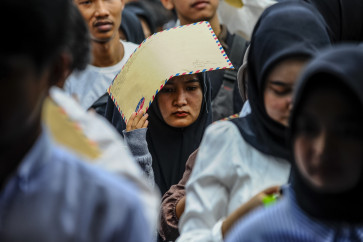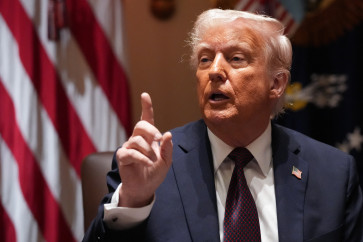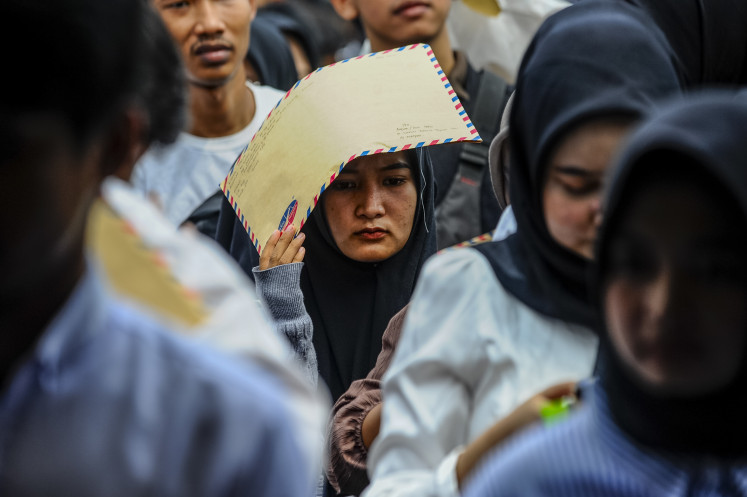WWF take on Indonesia's piles of plastic waste
The World Wildlife Fund (WWF) Indonesia has launched its most ambitious effort yet to clear the country of plastic waste, as the NGO recently launched its Plastic Smart Cities initiative
Change text size
Gift Premium Articles
to Anyone
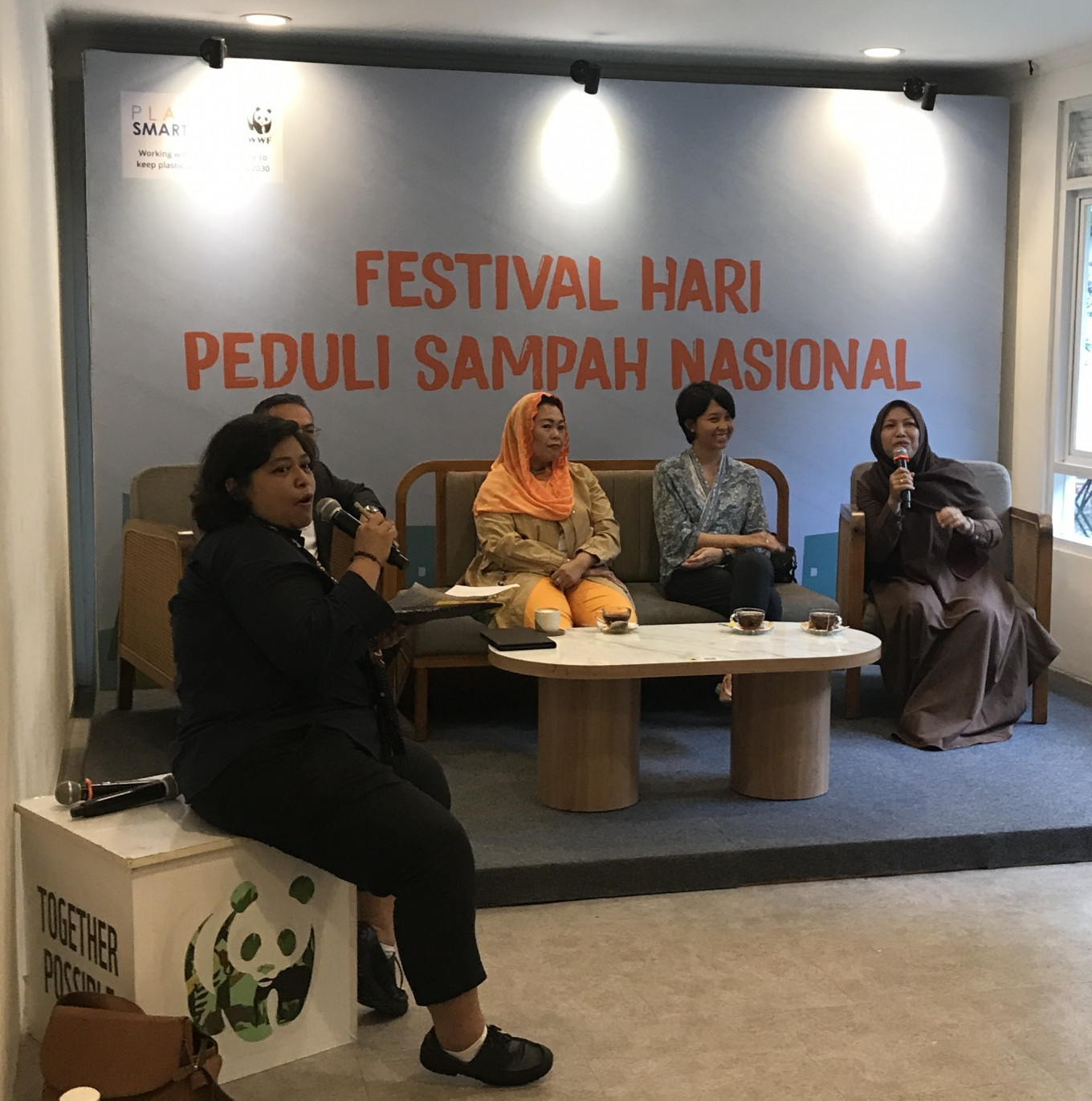
T
he World Wildlife Fund (WWF) Indonesia has launched its most ambitious effort yet to clear the country of plastic waste as the NGO recently launched its Plastic Smart Cities initiative
The sight of plastic waste floating in the oceans and rivers polluting the natural environment, blighting the landscape and endangering wildlife like sea turtles and dolphins is one that is all too familiar. While the sight might be the tip of the iceberg, it was enough to prompt the World Wildlife Fund (WWF) Indonesia to launch its Plastic Smart Cities website plasticsmartcities.id under the campaign slogan of “No Plastic in Nature”, with the stated target of no plastic in nature by 2030.
“Only 1 percent of all plastic waste in the ocean floats to the surface, while 99 percent sinks to the seabed… [WWF Indonesia] estimated that there are 8 million tonnes of waste [released] in the ocean annually,” noted WWF Indonesia’s Plastic Smart Cities initiative on its website, as well as affiliate plasticsmartcities.org.
Plastics, overpopulation and increased consumption
WWF Indonesia Climate and Market Transformation director Irfan Bachtiar said the program “aims to reuse plastic trash,” among other goals. He said that the Plastic Smart Cities program was based in Jakarta and its satellite cities of Bogor and Depok in neighboring West Java, due to their contribution to the waste crisis.
“[The public] often assumes that much of the waste originates from coastal areas, fishermen or shipping. In fact, they originate in rivers, upstream from inland areas that are brought downstream to the sea,” he said during the Plastic Smart Cities launch in Blok M, South Jakarta, on Feb. 25. “Jakarta generates over 72 million tonnes of trash annually, much of which is plastic. This stemmed from the capital’s growing population and the increase in consumption that comes in its wake.”
WWF Indonesia Plastic Smart Cities coordinator Made Putri reiterated Irfan’s points. She attributed the problem to the “linear economy”, where products are bound to become waste because of their design and manufacture, particularly the use of single-use plastics instead of their recyclable counterpart. This contrasts with the circular economy behind WWF’s initiative with its ‘reduction/reuse, separate/collect and recycling/recovery’ of plastics, as well as the management of landfills.
“[Humans have] produced more plastic waste in two decades than in the last 100 years. The main reason for this is because single-use plastics are cheaper to produce and dispose of than recyclable plastics,” she said. Putri added that single-use plastics and other forms of waste were found in various human settlements. “Single-use plastics and other waste might be found in cities, but they can also be found in rural areas or remote locations, like mountains.”
WWF Indonesia’s Plastic Smart Cities’ website notes that “75 percent of all plastics that have been produced end up as trash,” and that “[We] can reduce plastic waste by up to 60 percent by stopping the use of single-use plastics.”
Stepping up against plastic waste
Putri explained that the Plastic Smart Cities projects in Jakarta, Bogor and Depok had coordinated their moves against single-use plastics, starting with a drive against dry plastics in cooperation with a number of companies, universities and other institutions. But she acknowledged that Plastic Smart Cities still faced a challenge in tackling single-use plastics in wet markets.
Coordinating Maritime and Investment Affairs Ministry expert on maritime law Okto Irianto agreed, and noted that Indonesia still had an uphill climb in eliminating plastics.
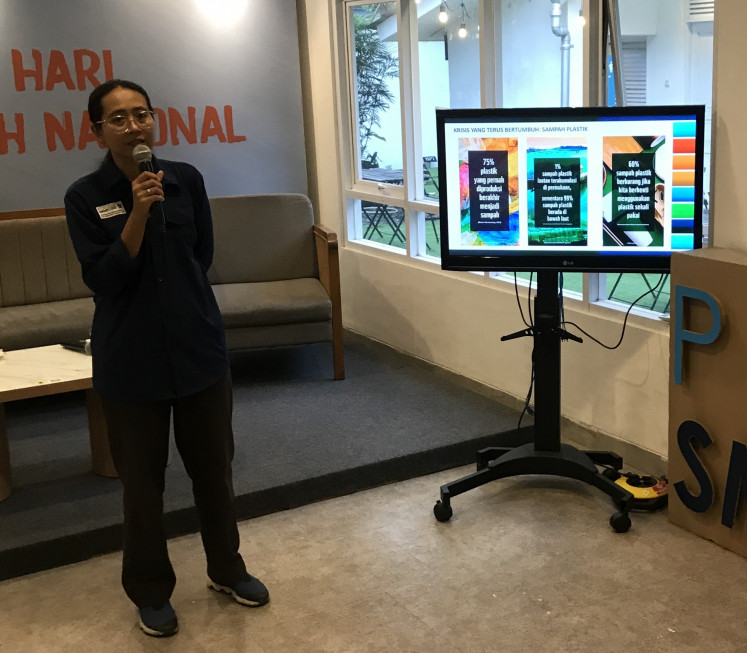
“Indonesia is the second highest contributor to marine waste, particularly from plastic waste, in the world. Major corporations are behind this development, as they produce an excessive amount of plastic,” said Okto. “[The government] aims to reduce the number of single-use plastics produced, and increase the production of recyclable, environmentally friendly plastics.” He added that the application of the circular economy model was the means to tackle this problem.
“The European Union provides a good example in dealing with plastic, as the bloc’s circular economy manages to reuse, remake and recycle 90 to 95 percent of plastics. This dwarfs Indonesia’s circular economy, which can only deal with 11 percent of plastic waste,” Okto asserted. He suggested the use of an excise tax on single-use plastic to be applied on cigarettes and other commodities to develop Indonesia’s circular economy and deal with the high price of making recyclable, environmentally friendly plastics.
“The plastic excise tax can make up Rp 1 trillion [USD$ 65,731,900] in annual revenue. However, initiatives for the tax have only been limited to the Industry Ministry, the Environment and Forestry Ministry as well as the Coordinating Maritime Affairs and Investment Ministry,” he said. Okto noted that while the tax was actually approved by the House of Representatives, its application was hampered by the Finance Ministry. “Six percent of the plastic tax revenue is allocated to the public. But lack of awareness about the initiative, as well as the lack of a control mechanism, has meant that only 2 percent of the plastic excise tax made its way to the public.”
Empowering women
Okto added that the success of recycling programs like Plastic Smart Cities depended on the public, not least public figures, clerics and women.
“Women play an important role in recycling drives by exercising their authority in the home and community, among others by instilling environmental awareness in their husbands and families. They are well-placed to do this because of their knowledge of consumer goods,” he said.
Wahid Institute director Yenny Wahid agreed.
“Women, particularly in rural areas, are savvy about environmental awareness. They are acutely aware of the need for a clean environment for their children to live and play in,” she said. “They are also enterprising in that they can turn their plastic waste into consumer goods such as wayang puppets. However, they need programs [like Plastic Smart Cities] to find them outlets to sell their wares.”
Among them is Vera Novita, the head of the Pulo Kambing Foundation, one of the Plastic Smart Cities initiative’s collaborators.
“We recycle plastics into consumer goods, then use the proceeds to build up their small and medium enterprises, save and buy gold. Other purposes include agriculture and cooperatives,” she said of the Pulo Kambing Foundation, which was named for the East Jakarta district where she worked and lived. “We also use the proceeds to teach the local people essential skills, such as Microsoft Office and English.” The Pulo Kambing Foundation is one of ten organizations working closely with Plastic Smart Cities in Jakarta, Bogor and Depok.
Whether Indonesia reaches its goal of zero plastic waste in the natural environment by 2030 remains to be seen. But the increased environmental awareness instilled in the Indonesian people by the WWF can still be seen as a step in the right direction.

